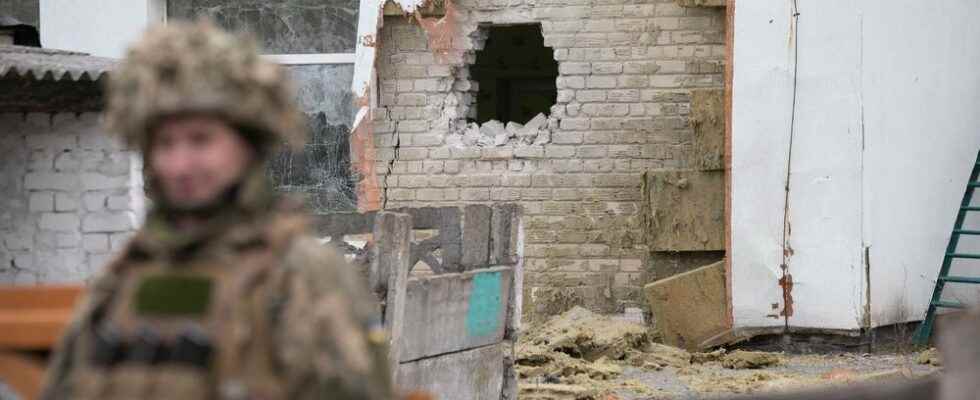With an almost British phlegm, Ukrainian President Volodymyr Zelensky wondered aloud last month: “What should we do? Only one thing: remain calm.” He added: “We will celebrate Easter in April. And then in May, as usual, the sun, the holidays, the barbecues.”
A month later, as the Ukrainian crisis reaches a new climax – on Friday February 18, shelling resumed on the front line in eastern Ukraine and the UN Secretary General declared that a war would be “catastrophic” – the coolness of the 44-year-old head of state continues to impress his foreign interlocutors.
For several weeks, the Ukrainian president and his team have minimized the alerts from Washington and London, which predict an attack which “could happen at any time”, while asking Kiev’s Western allies to provide them with real military support. A real balancing act: while preparing for the worst, Volodymyr Zelensky must reassure his population and economic circles, who are increasingly worried since dozens of capitals have asked their nationals to leave the country.
In recent weeks, the American Joe Biden has repeatedly praised his work in the face of pressure from the Kremlin and the approximately 100,000 Russian soldiers massed on the border. During his visit to Kiev on February 8, Emmanuel Macron expressed his admiration on several occasions. “His job is impossible, between the pressure of the Russians and the Americans”, estimates a European diplomat who does not hide his admiration either. “It’s all the more impressive that he doesn’t come from this universe at all.”
A soldier in front of a kindergarten damaged by a shelling, on February 17, 2022, in Stanitsa Luganska, eastern Ukraine.
afp.com/Aleksey Filippov
Four years ago, Volodymyr Zelensky’s only political experience was indeed to have interpreted, in a television series, the role of a clumsy history professor, catapulted to the head of the Ukrainian state after an anti- viral oligarchs filmed by his students. As soon as he was elected, for real this time, in May 2019, the former actor and producer also propelled friends and collaborators of his production company Kvartal 95 to key positions, still raising fears of a political catastrophe due to the inexperience of the latter.
However, even in one of the worst geopolitical crises since the end of the cold war, the comedian is doing quite well, note with astonishment foreign observers like political scientists. Kiev is consulted by its partners in the negotiations thanks to the intense work of Ukrainian diplomacy, receives military aid in abundance. The population, meanwhile, does not panic: no rushes to banks or supermarkets. Obviously, Zelensky is a reassuring president.
The Russian tanks did not arrive in Kiev on the night of February 16, as Washington publicly feared. On the contrary, the Ukrainian capital, overnight, covered itself with blue and yellow flags – the colors of the country. “We are told that February 16 will be the day of the attack, let’s make it Unity Day”, he anticipated in a sentence that resembles a sarcastic joke that resembles the one who was a comedian and a television producer before becoming head of state.
A Day of Unity has therefore been decreed, with streets adorned with flags and the national anthem sung in schools across the country. On social networks, Volodymyr Zelensky, alongside his wife Olena, even proposed a “challenge”: take a photo with the hashtag #UArazom (Ukraine, together) and challenge his friends to do the same by tagging them .
Petro Poroshenko, rival number 1
“The Day of Unity, why not … But it would be better if Volodymyr Zelensky reconciled symbolically with rival political factions,” said Olexiy Haran, professor of comparative politics at Mohyla University in Kiev. Because the president is criticized by the opposition, and in particular by his number one opponent: Petro Poroshenko. Accused in a case of “high treason”, the former Ukrainian president thus staged his return to the country with brilliance, at the end of January, in the hope of giving himself a new political impetus.
“Despite the external threat, the internal political struggles remain”, notes Olexiy Haran. However, political opponents do not cross red lines, do not demand early elections or the organization of massive demonstrations. Despite criticism within Ukraine, the ex-comedian remains ahead in the polls. And, in the event of an early election, it is he who collects the most voting intentions.
Volodymyr Zelensky juggles between the demands of his public opinion and those of his partners in the “Normandy format” (Russia, France, Germany). Several Ukrainian sources fear that Moscow will put pressure on Ukraine to apply the political aspect of the Minsk agreements. This roadmap for the resolution of the conflict signed in 2015 provides for the demilitarization of the separatist zone of Donbass and the cessation of fighting, but also the organization of elections in this region and the granting of a special status.
“It’s not something that Zelensky can ‘sell’ to his people,” says Olexiy Haran. Kiev believes that there is not enough progress on the security aspect, a prerequisite for political compromise. Since their signing, each attempt to impose the political part of the agreements – perceived as a means of legitimizing the presence of forces guided by Moscow – has been followed by an outcry in society. Its application could even bring down the Ukrainian government, observers warn.
